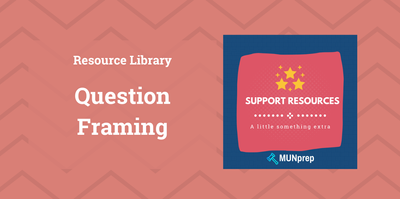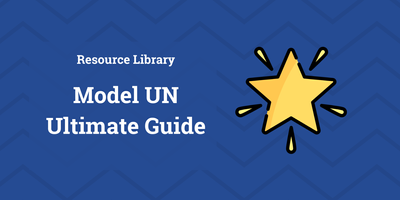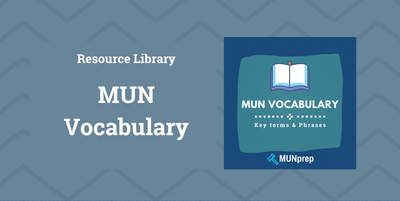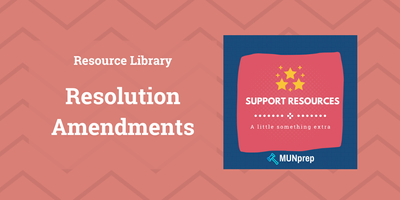Advanced Debate Skills for MUN Delegates
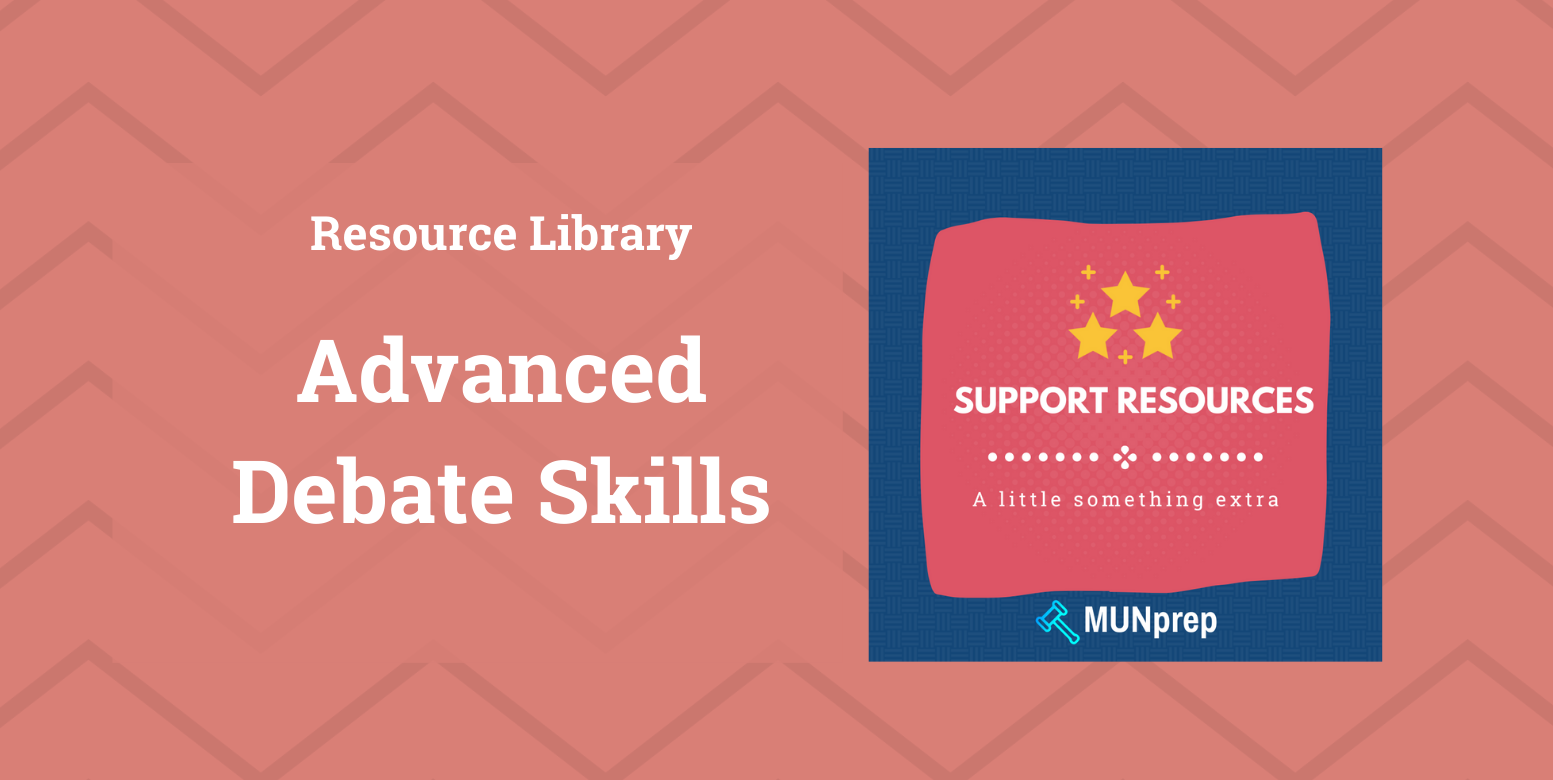
Debate in Model United Nations (MUN) is not simply about arguing for the sake of it; it involves a blend of diplomacy, strategic thinking, and persuasive communication.
As a delegate, you've got the job of taking on a country's stance, building alliances, and writing resolutions. Below, we'll break down some advanced debate skills that you can use during both a moderated and unmoderated caucus.
Debate Skills
1- Build Your Case
Crafting coherent, persuasive arguments is vital. In MUN, your arguments should be:
- Backed up by Evidence: Use data, historical precedents, treaties, and statistics.
- Aligned with National Policy: Ensure your arguments reflect your country’s real-world stance.
- Solution-Oriented: Demonstrate how your proposals address the agenda item practically.
How to Practice:
- Frameworks: Use tools like PEEL (Point, Evidence, Explanation, Link) to structure arguments during an unmoderated caucus, or with your notes.
- Anticipation: List potential counterarguments and preemptively prepare responses.
- Mock Debates: Practice debating with peers on current global issues.
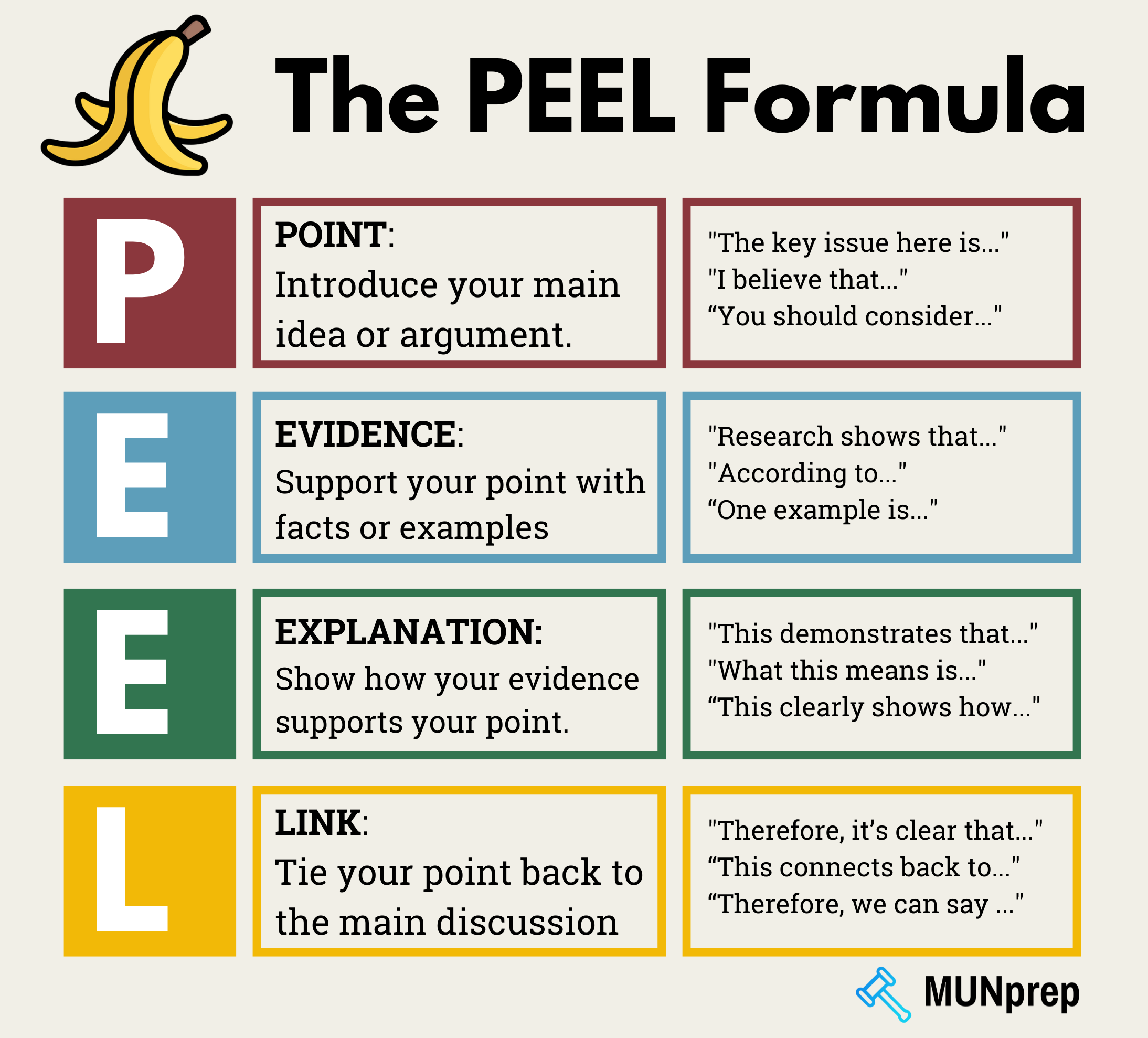
2- Strategic Rebuttals
Rebuttals allow you to challenge others’ arguments without alienating potential allies. Effective rebuttals:
- Focus on specific flaws in the opponent's logic or evidence.
- Are calm and factual, avoiding personal attacks.
- Reinforce your own position by contrasting it with the weaknesses of the other’s argument.
Tactics:
- Question Framing: Pose rhetorical or factual questions to discredit the opponent subtly.
- Example: “How does this align with Resolution 1234, which your country supported?”
- Logical Breakdown: Identify gaps in causality or unsupported assumptions.
- The Sandwich Method: Begin with agreement or acknowledgment, introduce your criticism, and conclude with your alternative solution.
Learn more about building a logical argument here!
3- Use Frameworks that Work
MUN debates require both formal speeches and informal remarks. Adapt your tone and style depending on the context.
Formal Speech Tips:
- Structure: Use the POP formula to make speeches stand out during a moderated caucus.
- Example:
- Opening: “Honorable Chair, esteemed delegates, today we address a crisis threatening global security.”
- Key Points: Use three bulletproof arguments to support your stance.
- Conclusion: Reiterate the urgency of your solution.
- Example:
- Delivery: Speak at a moderate pace, use pauses for emphasis, and modulate your tone to convey emotion.
Informal Speech Tips (Moderated Caucuses):
- Be concise—time is limited.
- Transition fluidly from other points: “Building on what Delegate X mentioned…”
- Stay flexible to new developments in the debate.
4- Leverage The Best Persuasive Techniques
Persuasive language elevates your arguments. Classic rhetorical techniques include:
- Ethos (Credibility): Show that your argument is backed by credible sources or aligns with UN principles.
- Pathos (Emotion): Evoke concern or empathy to inspire action.
- Example: “Millions of children are displaced, and we must act now to prevent further suffering.”
- Logos (Logic): Use statistics and facts to solidify your case.
- Example: “According to WHO, 70% of global infections occur in underserved regions.”
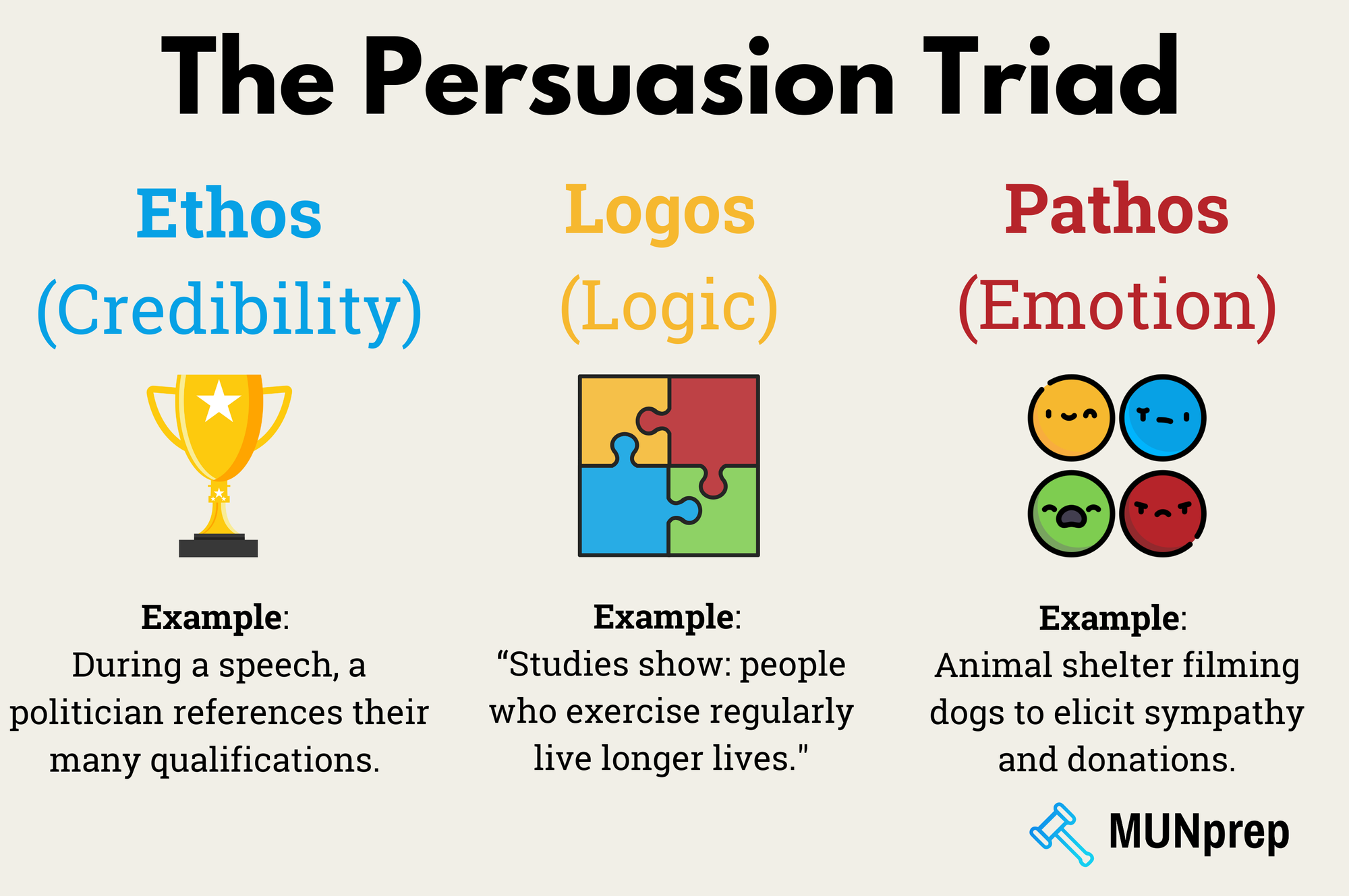
5- Questioning Techniques
Asking and answering questions effectively helps clarify or strengthen arguments.
Asking Questions:
- Clarify Ambiguity: “Could the delegate elaborate on how their proposal aligns with international law?”
- Challenge Subtly: “Given that your nation opposes sanctions, how would you ensure compliance without them?”
Answering Questions:
- Stay on Message: Redirect the question to emphasize your position.
- Acknowledge Limitations: If caught off-guard, admit the gap and promise to follow up: “That’s a valuable point, and I’ll consult further sources.”
Learn more about Questioning Techniques here!
Forming Alliances
In Model UN, forming alliances is more than just teaming up with like-minded delegates. Even when delegates are on the same side of an issue, differences in policy or approach may require debate and compromise.
1- Negotiation and Consensus-Building
Unlike traditional debates, Model UN thrives on collaboration. Effective delegates must not only argue persuasively but also work to unite others around shared goals.
- Find Common Ground: Start by identifying areas of mutual interest, even when specific policies differ.
- For example, if one country supports military intervention and another prefers diplomatic solutions, you could propose peacekeeping operations as a middle ground that addresses both security and stability.
- Divide and Conquer: Building a bloc of allies involves delegating tasks effectively.
- One delegate might draft clauses on education initiatives while another focuses on economic measures. This division of labor ensures the resolution covers all bases while allowing each delegate to showcase their strengths.
- Compromise Strategically: Be willing to concede on less critical points to secure agreement on your primary goals.
- If your top priority is securing funding for a climate change initiative, you might agree to another delegate’s demand to limit the scope of enforcement mechanisms.
2- Emotional Intelligence in Debate
In the high-pressure environment of a Model UN committee, the ability to manage emotions—both yours and others’—can set you apart. Emotional intelligence is essential for fostering collaboration and maintaining productive dialogue.
- Manage Conflicts: Disagreements are inevitable, but escalating tensions can derail progress. Instead of dismissing opposing views, acknowledge them respectfully.
- You might say, “I appreciate the delegate’s perspective on funding, though I’d like to propose a solution that balances financial constraints with our shared goals.”
- Build Rapport: Establishing a connection with other delegates can make them more receptive to your ideas. Humor, when used appropriately, can break tension. Alternatively, emphasizing shared goals, such as improving access to education or addressing food insecurity, can create a sense of camaraderie.
- Stay Composed: Intense debates can be stressful, but maintaining a calm demeanor is key. Practice deep breathing techniques or mentally remind yourself of your preparation.
3- Adaptability and Quick Thinking
Model UN debates are dynamic, often requiring delegates to think on their feet and adjust their strategies. Success comes from being able to monitor the flow of debate, adapt to unexpected challenges, and respond with confidence.
- Monitor Debate Flow: Keep track of recurring themes and key points raised by others. This allows you to go with the flow when you need to make a statement.
- For example, if the debate shifts to funding mechanisms for education programs, be ready to highlight your research on potential donors or innovative financing models.
- Implement Pivoting: When challenged, turn the critique into an opportunity to strengthen your argument.
- For instance, if accused of ignoring an existing resolution, emphasize how your proposal builds upon or complements it, such as by addressing gaps in implementation.
- Improvise Responses: Even with thorough preparation, unexpected questions or criticisms will arise. Use your research and critical thinking skills to craft on-the-spot responses.
Bonus!
Procedural Knowledge
Debate in MUN follows specific procedural rules. Understanding these is essential to maneuver effectively.
Key Points:
- Points and Motions: Know when to raise procedural points (e.g., Point of Order, Point of Information).
- Yielding the Floor: Choose whether to yield time to another delegate, the chair, or questions to reinforce your argument.
- Caucus Strategy: Use moderated caucuses for focused debate and unmoderated caucuses to build alliances.
Final Thoughts
To excel in MUN debate, practice is everything. Work together with your team - simulate debates, seek feedback, and refine your delivery.
While confidence and strategy are essential, never underestimate the importance of great preparation.
Overtime you will come to master these skills!

